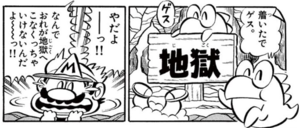Hell
Hell is the place of suffering and punishment that unrighteous souls are sent to after death, as outlined in various religions.
In chapter 8 of Super Mario-kun volume 4, Mario is killed by Larry and his spirit is dragged by some Eeries in Hell, where he meets the ghost of Bowser's ancestor Enma Daiō and many other enemies, including some Koopalings, that he killed (although the Koopalings are seen alive in later volumes). Mario is forced to endure punishment by their hands: first, Morton sings a song badly at full volume, then Mario is tossed into a sea of spikes, but saves himself with the Statue form, and lastly, Wendy's ghost forces him to eat cursed Valentine's Day chocolates. Mario starts spitting flames everywhere, burning everyone around him. Having had enough, Enma literally kicks Mario out of Hell, sending him back to the living realm.
Hell is heavily referenced in the Club Nintendo comic Super Mario in Die Nacht des Grauens. The creature Abigor claims to be the "middleman of Hell", and lives in a monster-filled temple called Infernum, which is a Latin term for Hell. He also says "Welcome to Hell" when Mario and his friends enter the temple in their quest to save Princess Toadstool, who was kidnapped and turned into a zombie by Abigor. Because of what Abigor did to her mind, Toadstool tells her would-be savior, Mario, that his "mother was scraping toilets in Hell."
In the final broadcast of Shitamachi Ninjō Gekijō, a man arrives in the depths of Hell after controlling Mario with a game controller.
In the Japanese version of the game Super Mario Galaxy, Melty Molten Galaxy is called "Hell Prominence Galaxy". This is reflected by the Super Mario Galaxy Original Soundtrack, in which the theme of the galaxy is entitled "Hell Prominence". It is also allegedly mentioned in WarioWare: Touched! in Ashley's Theme.
The Underwhere of Super Paper Mario is often compared to Hell, but it bears much more resemblance to the Greek underworld, Hades. While the sinless are allowed to spend eternity in The Overthere (which bears more similarities to Hell's counterpart, Heaven, than to the Greek Elisian Fields), the inhabitants of The Underwhere do not suffer for their crimes. Unlike Hell, The Underwhere is merely a place of boredom, and many other aspects of The Underwhere are references to Hades, strengthening the Greek connection. For example, the River Twygz is a reference to the river Styx, and both have ferrymen who take visitors across.
Names in other languages[edit]
| Language | Name | Meaning |
|---|---|---|
| Japanese | Jigoku |
Hell |
| German | Hölle |
Hell |
